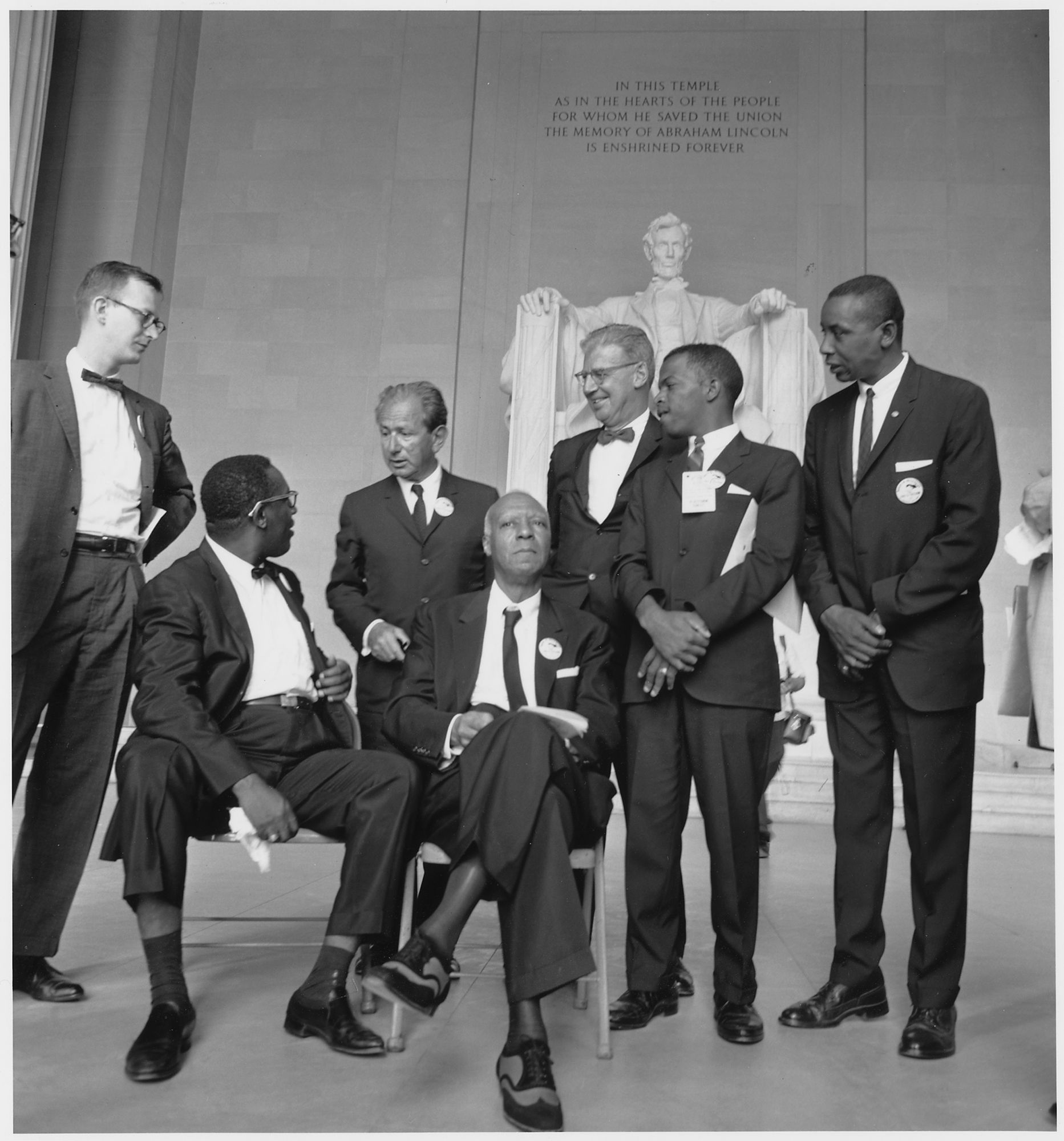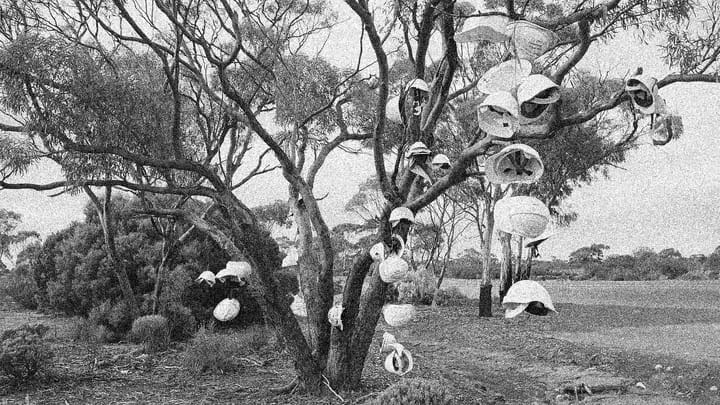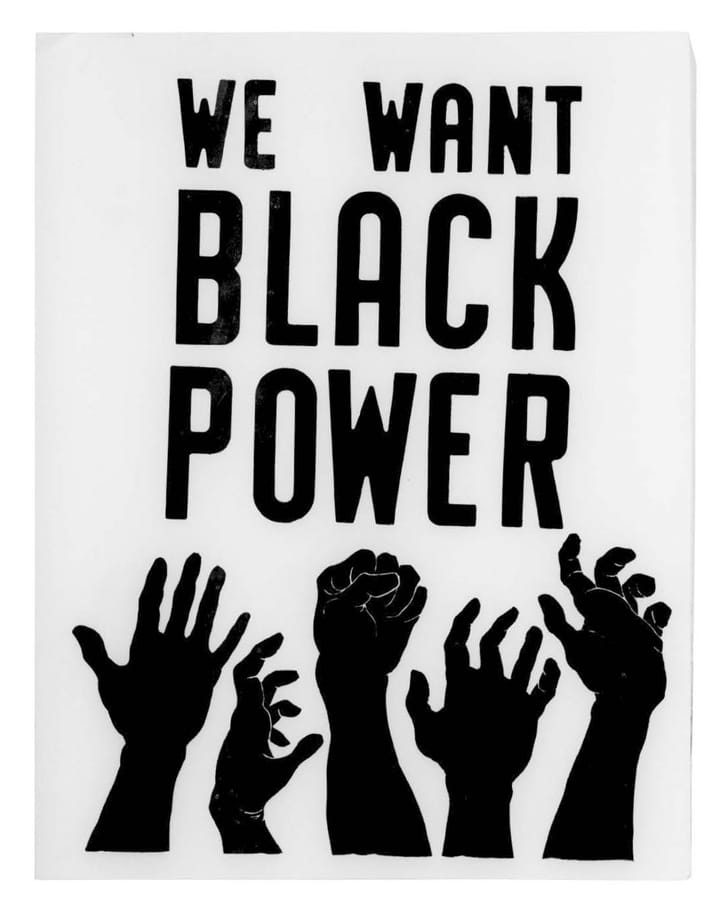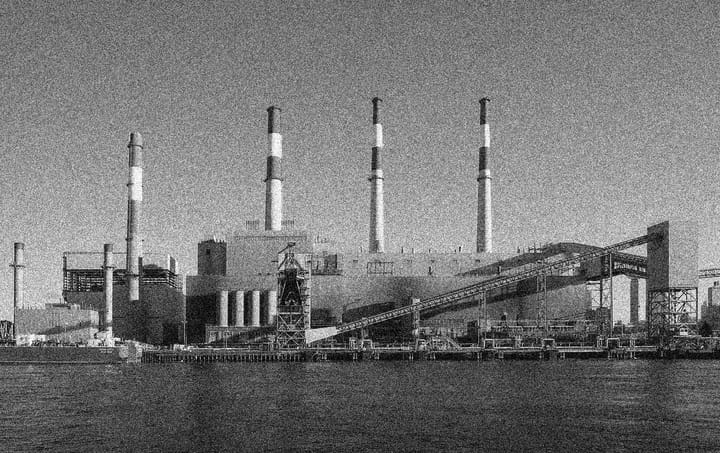A. Philip Randolph on Labor Day and Racial Justice
A. Philip Randolph was one of the most prominent civil rights and labor leaders of the twentieth century. Here his Labor Day address at the Civic Arena in Pittsburgh in 1967 is reprinted in full.

A. Philip Randolph founded the Brotherhood for Sleeping Car Porters in 1925 and was president of the African-American-led labor union until his retirement in 1968. He was also the driving force, along with Bayard Rustin, behind the March on Washington for Jobs and Freedom in 1963 and the Freedom Budget campaign of the mid-1960's (Damage editor Benjamin Fong has an article about the latter in the most recent issue of the Catalyst journal). The following is the text of an address given by him on Labor Day, September 4th, 1967 at the Civic Arena in Pittsburgh.
This Labor Day is marked by a world in crisis, change and revolution.
Pope John XXIII's Encyclical, Pacem in Terris (Peace on Earth) reflects the vision of a world order—and a challenge to modern man with the fearful weaponry of the atom bomb.
A major threat to the peace of the world, as a result of the failure of the leaders of the great nation-states to resolve by negotiation the existing disputes among the great powers, is the lack of effective action to narrow the widening gap between the white affluent nations and the disadvantaged, increasingly discontented two-thirds peoples of color of mankind that live in poverty and degradation.
The need for effective action to relax the growing tensions and to arrest the present trend, which allows the rich nations to become richer and the poor nations to become poorer, is overwhelmingly great and imperative. Without achieving this objective the conflict between the house of "haves" and the house of "have-nots" will be as great a threat to the peace of the world as nuclear weapons of war.
It is vital that western man realize that there can be no universal consensus to achieve a warless world so long as two-thirds of the world's rapidly growing population is fighting a losing battle for survival. Hungry, sick, impoverished, ignorant and oppressed people can do no more than struggle against the cruel present, and think of the future world only in terms of their own hunger of body and hunger of soul.
Cognizant of this deepening and dangerous human condition of poverty and want, Pope Paul VI issued his encyclical, Progresso Populorum (Development of Peoples). This is a timely pronouncement concerning the need for development of peoples of poverty in the world.
In Geneva, a clear call to mankind, concerning the growing risk of a third World War to the peace of the world, has been vigorously registered by the Rev. Dr. Eugene Carson Blake, Secretary of the World Council of Churches.
Problem of Poverty at Home
It is well to take note of the fact, on the occasion of this celebration of Labor Day, that just as the plight and plague of poverty of some two billion peoples of color in the world constitute a grave peril to the peace of the world, so poverty of millions of people of color in the United States constitutes a danger to peace in our land where the poor grow poorer and the rich grow richer.
While the percentage of black Americans in the poverty line in practically all of the big cities is bewildering and frighteningly high, especially among teenagers, ranging in some areas around 40 to 50 percent, there are millions of white Americans in the poverty line—with the big difference that most impoverished white Americans, chiefly because of color, have the opportunity to escape into greener economic pastures while Negroes, because of color, find it more difficult and often impossible to escape.
Thus, while there are Negroes who have acquired education and training and have broken out of the poverty line, the broad masses of black Americans, because of a lack of opportunity for training and education, have been sentenced to a perpetual bare, hopeless existence for themselves and families in the most debasing, degrading and dismal areas in America, the black ghettos, breeding grounds of crime, narcotics addiction, rats and roach-infested slum housing, and high prices for poor quality goods.
Not Jobs Alone
But Negroes don't want jobs only. They want jobs with a living wage and decent working conditions with opportunity for advancement, with acquired training and skills, to higher wage levels to provide higher purchasing power with which to secure a more abundant life.
Role of Labor Unions
However, good jobs mean little without the means to protect them and make them better and secure. Hence, more than a million and a half Negro workers are members of unions affiliated with the AFL-CIO. Although the house of labor is not yet fully free from racial discrimination, only a few segregated local unions are left. The Negro worker is moving steadily ahead in apprenticeship training for membership in the highly skilled trades, increasingly with the cooperation of a sound, forward-looking leadership, and his militant refusal to take no for an answer.

Civil Rights–Labor Alliance
One of the great constructive developments of the early 1960s was the alliance of the Civil Rights Freedom Movement and the American Federation of Labor and Congress of Industrial Organizations, without which it is highly doubtful that the Civil Rights Act of 1964 and the Voting Rights Act of 1965 could have passed in the Congress. And it is also highly doubtful that without the civil rights–labor alliance the fight of the AFL-CIO against anti-labor Right-to-Work laws in Oklahoma and Ohio could have succeeded.
If there is any single basic cause of the increasing value of the Negro market it is the wage increase of millions of Negro workers, made possible through the struggle and power of the organized labor movement. This fact renders a civil rights–labor alliance basically meaningful for it reflects the stake labor and civil rights have in such an alliance. Thus, the basis of the new Coalition, to fight for more and better jobs, integrated housing and education in the cities, is properly the civil rights–labor alliance.
While Negroes have the task of fighting to eliminate every vestige of racial bias in labor unions, as well as in business, schools, and even churches, Negroes and labor must have the good sense never to permit anything to break up the mutually advantageous labor–civil rights alliance even though they may not be in one hundred percent agreement on tactics and strategy at all times.
The reason for this alliance is simple and clear. It is that ninety-nine and nine-tenths percent of Negroes are workers who must work and fight for a living. Therefore, they belong in unions, not black unions competing with white workers to the disadvantage of black and white workers and to the advantage of business, but in unions of white and black workers devoted to fight for all workers regardless of race, religion or national origin.
Riots in the Streets
Therefore, the solution of the basic problem of Black Americans is not riots in the streets, looting, vandalizing and pillaging stores, violence and lawlessness, throwing Molotov cocktails into buildings setting them afire, resulting in burning down their own communities, with Negroes being the chief victims of gunfire. While stores can be restored, the lives of dead Negroes, some teenagers, are gone forever.
But it must not be forgotten that Negroes are not the only Americans who have staged riots in the streets. The Founding Fathers staged riots in the streets of Boston against King George III of Great Britain and seized the tea of British merchants and threw it into Boston Harbor. The workers staged riots in the streets for the right to form unions and against starvation wages. White women rioted for women's suffrage. Farmers rioted and burned up their farms to create a scarcity of products to increase prices. However, this is in historical explanation, not justification of riots.
In a free, democratic society, with the right of free speech, free assembly and the right to vote, there is no logical reason for riots to achieve basic and desirable social change.
The fact is there can be no racial and social justice and freedom except within the framework of civil order, and there can by no civil order except upon a basis of racial and social justice.
Permit me to emphasize the fact that the behavioral patterns young Negro teenagers display in riots in the streets are products of the ghettoization of their lives from birth, which has created in them a deep sense of frustration, alienation, resignation, desperation and hopelessness. Some of them are drug addicts, too weak to kick the habit. They are sick and need medical and psychiatric therapy. They are not hardened, evil criminals though their deeds are criminal and must be curbed in the interest of themselves, innocent citizens, and society as a whole. They can be physically and psychologically restored to normality and a useful life if firmly apprehended.
Moreover, these teenagers and adults who engage in looting stores in riots, represent a minuscule percent of Negro youth, and Negroes generally, but they constitute a menace to law-abiding citizens. Their breed is belched up in every transition and convulsion of social change. The adults who loot are not Negro workers. They are the lumpen proletariat who, in every revolution, prey upon property and persons and hence must be made to pay the price for their crimes.
Let no one, black or white, be deceived into believing that violence can win freedom and justice. Violence only begets violence. No one wins. Everybody loses, but especially the Negro, as shown in the recent riots. When leaders, black or white, counsel violence, they are like children playing with matches in an attic filled with dynamite in a house full of people. It is unthinkable; it cannot be tolerated. It is a matter of experience that anyone can start a fire he cannot stop.
And, while criticisms of President Johnson's policies may be justified, civil rights leaders in particular, and Negroes in general, should not forget that President Johnson has done more to advance the cause of civil rights than any president in the history of this country, including Abraham Lincoln.
The paradoxical age we live in is well illustrated by the opening of Dickens' "Tale of Two Cities":
It was the best of times, it was the worst of times, it was the age of wisdom, it was the age of foolishness; it was the epoch of belief, it was the epoch of incredulity; it was the season of light, it was the season of darkness; it was the spring of hope, it was the winter of despair.
Dickens, of course, was writing about the time of the French Revolution but his dreams are not inapplicable to this era of the Civil Rights Revolution in America.
On the one hand, Black Americans are earning more and spending more today than ever before in their history. In this respect they are living in "the best of times... the season of light... the spring of hope."
On the other hand, there is a wide gap between the annual income of Negro and white families, unemployment among Negroes is twice as high as among white Americans, and they are sentenced to segregated housing and segregated schools. Thus, for the Negro it is "the worst of times... the age of foolishness... the epoch of incredulity... the season of darkness... the winter of despair."
Threats
Finally, to my Negro brothers whom I love, with all your faults along with your virtues, let us stop this talk of burning down cities and urging Negroes to buy guns—which is a species of senseless suicidal folly and a pathetic exhibition of a sickness of infantile leftism and extremism.
Moreover, the cry of Black Power by some well-meaning but misguided leaders cannot achieve real power—economic, social and political—which every Negro naturally ought to fight for. Black Power is a giant leap backward to the degradation of segregation which, for a hundred years, has been and still is the source and cause of Black Americans being at the bottom of the economic, political and social totem pole. It is just a weak edition of Garveyism, which was bankrupt, repudiated and rejected in the 1920s.
Let us not retreat to segregation or racial isolation in the search of the road to economic, social and political salvation, for segregation is an evil and vicious thing originated and devised by the Ku Klux Klan and the worst elements of anti-Negro forces in America.
I reject the concept of Black Power because of its obvious overtones of racism. Black racism is just as ugly, indefensible and unsound as white racism. White racism begets black racism and black racism begets white racism. Black and white racism tends toward the polarization, with incentives for hostile confrontation, instead of the cooperation of the races—a major imperative for the achievement of social peace and progress.
The inspiration and motivation of Negro youth to strive for the realization of their highest intellectual potential, for the service and advancement of Black Americans, requires a profound sense of historical identification with the glorious and ancient African cultural heritage, tradition and endowment which will give them a belief in their role of creative somebodyness in the society of man.
This concept stems from the reality of the challenge of Africa in her struggle for her place in the sun of history with all the races of mankind, not from racial hate and conflict reflected in the slogan of Black Power.
On this Labor Day may all workers, black and white, Catholic and Protestant, Jew and Gentile, join hands as members of one common human family of which God is Father and Creator, to banish fear and human hate from this land.
If all men are members of one common human family then all men are brothers; if all men are brothers then all men are equal; if all men are equal then all men are entitled to equal treatment; if all men are entitled to equal treatment, racial discrimination and segregation are morally wrong and should be abolished, and respect for the dignity of the personality of every human being recognized as his sacred right, a right which is God-given and not man-made.
*Note: The version of this speech is from the A. Philip Randolph Papers at the Library of Congress. A slightly different version can be found in the Congressional Record here.
■
A. Philip Randolph was president of the Brotherhood of Sleeping Car Porters from its founding in 1925 until 1968. He first threatened a March on Washington in 1941, an action that led to ban on discrimination in the defense industries, and then spearheaded the March on Washington for Jobs and Freedom in 1963, appointing Bayard Rustin its lead organizer.



